|
“Human Rights” were “self-evident” both in 1776 and in 1948. Behind them we do not a moral philosophy but a story of softening of sentiments toward the infortunate and criminal parts of humanity and a movement to use this new sentiment as a substitute for fading Christianity in its function of limiting the power of government. However Human Rights sacralize secular objects and they work against any sovereign, including the people. |
||
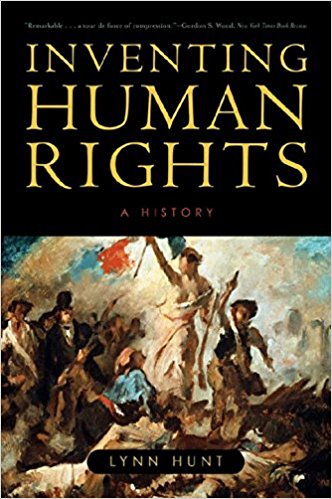
“Inventing Human Rights” as last Sacred Bulwark against Reason of State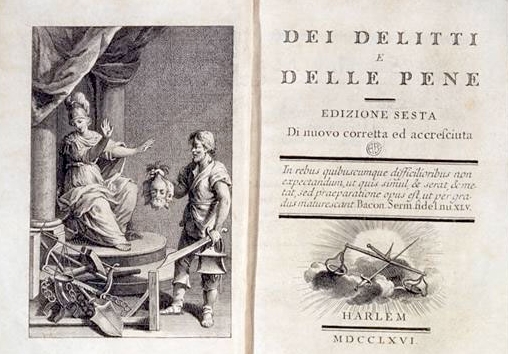
A lecture of Prof. Lynn Hunt has brought some more clarity into my thinking about Human Rights. The following main theses can be inferred from her lecture.
Lynn Hunt is the author of a much-acclaimed book “Inventing Human Rights”. Her lecture is very informative and provides clear insights into the weakness of the “Human Rights” discourse, even though it is part of a series of lectures that treat “Human Rights” as an extremely important bulwark against an onslaught of tyranny in a vicious world. On Youtube we read the following introduction:
HR indeed have the funtion of a bulwark against Reason of State of all sorts. This function is derived from a shared religious feeling (self-evidence) and a body of legal code. The bulwark has meanwhile turned against the peoples themselves. The insights provided by Lynn Hunt combine neatly with those from Samuel Moyn (“The Last Utopia”) and Jean-Louis Harouel (“Human Rights against the People”). All three theoreticians note the religious aspect of the HR movements and its function as an occupant of a void left by Christianity. As a scholar of religious history, Prof. Harouel goes one step further and attempts to construct a line of ancestry from competitors of Christianity, namely Gnosis and Millenarism, to the HR creed. Also from M. Stanton Evans we can learn that Christianity provided a more balanced world view in that it did not attach sacarality to worldly objects such as either the human personality or the holders of political power. Christianity used to work toward limitation of temporal power by treating this power as a foreign, non-religious force that could not command any worship but itself had to be limited. This can be seen from the cooperation of Christian forces in limiting the power of kings, forming Magna Charta, deposing Richard II and much more. The HR Creed substitutes Christianity’s function of limiting temporal power. This may have been useful in times were an overreaching state was our paramount problem and reason of state was likely to be abused and become a source of danger. The sword has turned the other way today due to the fluidity and regressivity of the concept and its capture by international judicial powers. 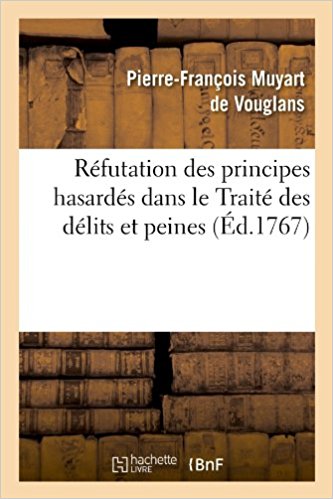
Muyart de Vouglans: Old School loses War of Ideological Fashion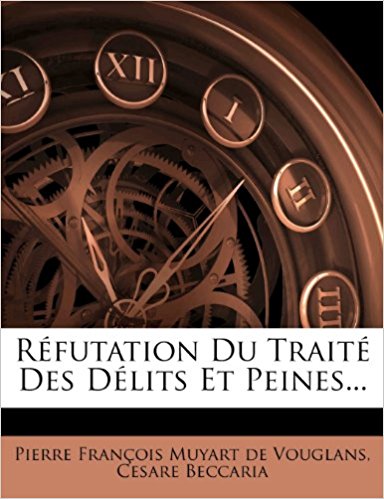
The Refutation of Cesare Beccaria by the famous law scholar Pierre-François Muyart de Vouglans attained great notoriety as did the work by Beccaria. Both fell into a time where the issue at hand was very hot. The editor and translator of Beccaria were enthusiastic about the humanitarian virtue-signalling of Beccaria, and Muyart, in criticizing, felt a need to point out that he was as a human being no less gifted with empathy than Beccaria. The judicial scandals around Calas and Chevalier de La Barre had prepared the ground. While Beccaria failed to convince the legal professionals of the time, he propelled a change of attitudes forward, and Muyart was one of very few conservative opponents who were willing to speak up at all. The book by Beccaria seemed to express a spirit of humanitarian anarchism. Muyart aptly quoted passages from the book that make it appear suspicious. Beccaria uses incoherent arguments about Social Contract in favour of judicial laxism and even against the concept of property rights. One would have believed that this would make Beccaria popular with 19th century critics of property rights like Proudhon, but Proudhon himself dismisses Beccaria as worthless hunting for applause in polite society and even “effeminate”. Beccaria was rewarded for his book with a professorship in economics in Milan and never again touched on the field of penal law, nor did he ever produce any famous work in economics. Muyart became known as the enemy of Beccaria but he later recycled the same arguments against other books, including the Spirit of the Laws by Montesquieu, against which his case was less strong and the tide of the time had changed. As when arguing against Beccaria 20 years earlier, Muyart presented himself as a magistrate who upholds the God-wanted royal order against subversion by people with suspicious intentions. He also became increasingly motivated by a fervor for Christianity and in particular catholic absolutism, which he shared with Father Romain Joly, an eccentric capucin monk. This made his views look more and more obscurantist and impopular, thus helping the cause of the law-softening movement rather than bringing it under real pressure. As late as 1948, the year of the UN Declaration of Human Rights, a human rights activist lawyer conducted a symbolic guillotine execution of the much-hated Muyart in Geneva. While Muyarts insistence on Christian absolutist world order narrative that had lost support among the intelligentsia of this time as of 1785 made him look obscurantist especially in the eyes of Manon Roland, a famous female revolutionary who attacked him with particularly harsh words and ended under the guillotine in 1793, the narrative of the new softer age was not better founded in any reason either. Muyart pointed this out by saying that penal law is a field of experience forged over the centuries rather than of philosophical doctrines. Most of the philosophical doctrines underlying the softening movement were without merit or incoherent, but they matched a widely felt need. Some of the reforms may even have served the interests of differentiation and efficiency which are called “modernity”, but the pendumlum soon swung back to the old school under the Napoleonic code, and it has swung back and forth ever since. This reminds me of Reinhart Kosseleck and his famous classic “Critique and Crisis” which describes the development of the French enlightenement movement as an attempted of a rising bourgeouisie to grab power by undermining the absolutist order and its carrying foundations, by which it had been protected from civil disorder, thereby ultimately pushing toward a crisis that unloaded itself into a revolution, after which the previous culture lost its foundations and plunged into further crises. What in the context of the late 18th century had become “obscurantism” had previously been a well-functioning order. In the American case, this order itself led to a a so-called revolution which really just was a conservative independence movement that revolted not against absolutism but against a British Glorious Revolution and its ensuing overreach of parliamentary power. Thus, when Jefferson spoke of “self-evident truths”, his evidence still came from the Christian tradition and had almost nothing to do with that attempt at replacing Christiany-based self-evidence with philosophical pretense that was presumptuously called “enlightenment” (lumières) in France. 
More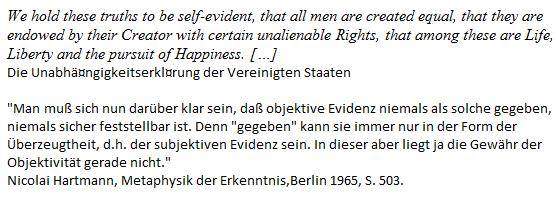
The Declaration of Human and Citizens’ Rights of 1789 was not a very radical document by today’s standards. It did contain some sweeping statements which show religious exuberance such as the assertion that lack of respect of human rights is the root of all social evil. The Declaration did not yet contain anything like the right of asylum or non-refoulement or demands to otherwise tolerate immigration and submission to imported culture, but these could be foreseen as further stages of development. E.g. just as the “human rights” of the Declaration were a politization and codification of a new norm of universal politeness across class boundaries, the same is true of today’s global humanitarianist call for non-refoulement and by it acceptance of a freedom of migration, which at best is to be subjected to ordered process (safe passage). Also, today’s globalist cabale may be driven not so much by a political theory or purpose as by a sense of globalized politeness that is then somehow translated into law. A discussion on my Facebook page is produced some insights. … The term “natural law” had a larger and perhaps more useful meaning than “human rights”. There is a newer use of “natural” vs “positive” rights that can be easily confused with the old distinction between “natural” and “positive” (i.e. manmade) law that Muyart uses and yet is in effect very similar. In this use, found e.g. in an article by Eugene Volokh, negative rights (i.e. defensive ones) are more natural (directly derived from the person’s interests) than “positive rights” that demand favourable action by a third party such as the state. 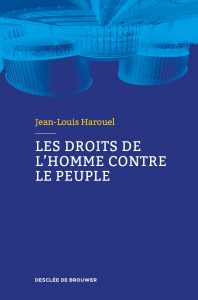
|
||
